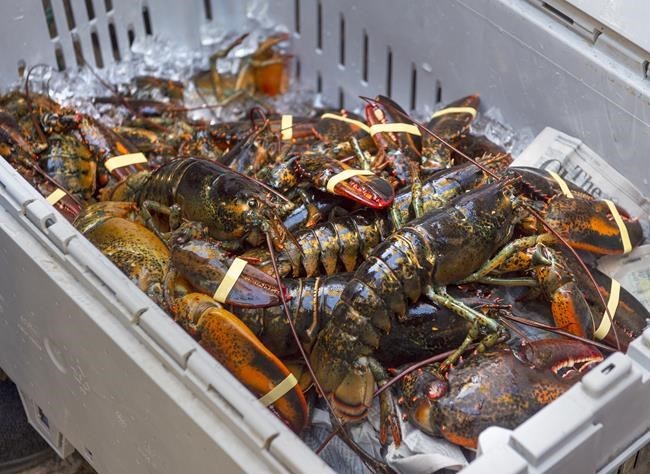HALIFAX — The chief of the First Nation behind a disputed moderate livelihood lobster fishery in Nova Scotia says recent vandalism and the loss of potential sales have cost the band more than $1.5 million — and he wants those responsible to be held accountable.
Mike Sack, chief of the Sipekne'katik First Nation, also alleged the band had been blacklisted by lobster buyers.
"The (non-Indigenous) commercial fishery has systematically boxed us out of the market," Sack said in a statement. "It will take time to rebuild our relationships in the supply chain of people and companies we did business with who are now rightly afraid of retaliation."
Sack told reporters the band filed an application for a court injunction aimed at preventing people from harassing Indigenous fishers at the wharf in Saulnierville, N.S., where the livelihood fleet is based.
"We want the injunction to make sure people are safe in and around the wharf," Sack told a news conference in Digby, N.S.
Later Wednesday, Nova Scotia Supreme Court Justice James Chipman granted the interim injunction, which among other things prohibits anyone from "threatening, coercing, harassing or intimidating" band members or people doing business with them.
It prohibits any interference with Sipekne'katik fishing activities, including interfering with their gear at sea or on land. The order, which is in force until Dec. 15, also says the Saulnierville wharf, another in Weymouth and a lobster pound in New Edinburgh used by the band cannot be blockaded.
The First Nation attracted national attention on Sept. 17 when it launched a "moderate livelihood" fishing fleet in St. Marys Bay in southwestern Nova Scotia, almost two months before the federally regulated fishing season was set to open.
Sack has said the Mi'kmaq band's members are exercising their constitutionally protected treaty right to fish where and when they want, as affirmed by the Supreme Court of Canada in a 1999 decision.
Citing treaties signed in the 1760s, the court said the Mi'kmaq, Maliseet and Passamaquoddy bands in Eastern Canada can hunt, fish and gather to earn a "moderate livelihood."
However, non-Indigenous protesters have asked federal authorities to stop the Indigenous harvest because the Supreme Court ruling also said Ottawa could continue to regulate the fishery — so long as it can justify such a move.
The dispute has escalated into confrontations marked by violence, arrests and allegations of assault and arson. Two buildings storing lobsters caught by Indigenous harvesters were vandalized last week, and one of them was burned to the ground on Saturday.
Amid rising tensions, the First Nation says it can't sell lobster caught by those taking part in its moderate livelihood fishery or the band's commercial communal operation to the east in the Bay of Fundy.
"It's like we've been blacklisted, and we're just hopeful that we can quickly come to some resolution and expedite getting our lobster to market," Sack said, adding that the band is also having a hard time buying new lobster traps.
"Pulling our commercial fishery this week and for the upcoming seasons will financially devastate our community," he said.
A spokeswoman for the First Nation said the 11 boats taking part in the moderate livelihood fishery will continue to haul in their catches from Lobster Fishing Area 34 and put them in storage.
However, Sack said the band's three boats used for the communal commercial fishery, which were operating in an adjacent area that opened for fishing last week, have been pulled from the water due to "intimidation and market embargoes."
The chief said the three boats will be dispatched to St. Marys Bay to provide protection for the livelihood fleet. As well, he said the band is looking for a way to sell the 6,800 kilograms of lobster the band has harvested from the bay since Sept. 17.
The provincial government regulates the sale of lobster by granting licences to approved lobster buyers. Sack said the band is looking for a provincial exemption, but he indicated the province wasn't in a co-operative mood.
"(Premier Stephen) McNeil just seems to be hiding behind the federal government," he said.
Meanwhile, the RCMP continues to draw fire for their response to the violence, which included an alleged assault on Sack last week.
Speaking at a news conference Wednesday in Ottawa, RCMP Commissioner Brenda Lucki defended the police force, disputing Indigenous Services Minister Marc Miller comment Monday that the Mounties had "let down" Indigenous people.
"We are fully committed to keeping the peace, keeping people safe and enforcing the law," she said. "Our actions to date are indicative of our strong commitment to this mandate."
Lucki confirmed additional officers from the other Maritime provinces had been dispatched to Nova Scotia: "When we saw that this situation was evolving, we felt that there was a need to bring in additional resources."
Senator Murray Sinclair, who was chief commissioner of the Truth and Reconciliation Commission, said Wednesday he was dismayed by the RCMP's lack of enforcement in Nova Scotia.
During an online conversation with the Assembly of Manitoba Chiefs, the senator criticized the RCMP for "literally standing by and doing nothing" while criminal acts were being committed.
"To me, (it) was an act of negligence," Sinclair said, adding that he had submitted a complaint to the RCMP's complaints commission. "They were in fact facilitating the actions of the (non-Indigenous) fishers."
On another front, Mi'kmaq leaders in Cape Breton are accusing the federal Department of Fisheries and Oceans of illegally removing lobster traps set recently in St. Peters Bay.
The 200 traps were placed in the bay as part of a similar moderate livelihood fishery, which is also operating outside the federally regulated season.
"The seizure of these traps by local officers are without the authorization or authority of their department or the minister," the Assembly of Nova Scotia Mi'kmaw Chiefs said in a statement. "This is unacceptable and unlawful."
This report by The Canadian Press was first published Oct. 21, 2020.
Michael MacDonald, The Canadian Press


